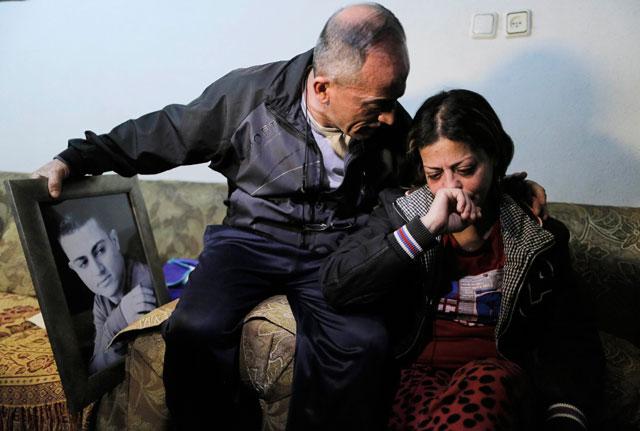You are here
Leave or let live? Arabs move into Jewish settlements
By Reuters - Dec 07,2014 - Last updated at Dec 07,2014
OCCUPIED JERUSALEM — Little noticed amid the furore over one of Israel's most contentious policies, a small but growing number of Arabs are moving into Jewish settlements on occupied land in East Jerusalem, drawn by cheaper rent and better services.
For decades, Israel has encouraged Jews to settle in East Jerusalem, changing the population balance, provoking Palestinian anger and drawing international condemnation.
But in one such settlement, around Mount Scopus where the Hebrew University is based and many Palestinians study, almost a fifth of residents are either Arab citizens of Israel or Palestinians, according to Israel's Central Bureau of Statistics.
"Really it's not a matter of ideology," said Rawya Mazal, an Arab Israeli realtor who sells or lets properties to Palestinian families in a nearby settlement at French Hill. "It's about convenience, living close to campus or making an investment."
Cross-community relations aren't always harmonious. Few if any Arabs live on Jewish settlements in the occupied West Bank, and a surge of violence in recent months has persuaded some to leave those in East Jerusalem.
Like so much in the region, the ethnic mix is complex. Official figures from 2013 show 7.4 per cent of French Hill residents are Arabs, and Mazal believes the true non-Jewish population is closer to 20 per cent.
While the high proportion of Arab residents in French Hill and Mount Scopus is probably exceptional, the trend is visible in other East Jerusalem settlements too.
In the working-class areas of Pisgat Ze'ev and Neve Yaacov to the northeast of Jerusalem's Old City, 1 to 2 per cent of residents are now Arab Israeli or Palestinian, figures show.
The Jerusalem municipality does not collect ethnic data, but Uzi Chen, the City Hall representative for northern districts, said "several hundred" Arab families live in Pisgat Ze'ev and Neve Yaakov, which have a combined population of 63,000.
Palestinians living in the settlements are mostly from East Jerusalem, which Israeli forces occupied in the 1967 Middle East war. As Israel regards all of the city as its unified capital, they hold Israeli residency permits although they are not citizens.
However, most world powers do not recognise Israel's designation of East Jerusalem, and want to see it as the capital of a future Palestinian state.
Upsides and downsides
Sabrine Jabber, 26, is a Muslim Arab who has spent half her life in Neve Yaakov, a collection of white high-rises that expanded as a settlement in the 1970s.
While living in a religiously conservative neighbourhood, she plays down the effect of the recent tensions in Jerusalem that have led to violence between Palestinians and Israelis.
"Nothing has changed for us," she said, sunning herself on the rear terrace of her block. "My neighbours know me and I know them. We get on fine."
Arabs living in Neve Yaakov tend to send their children to schools in the nearby Palestinian neighbourhood of Beit Hanina, and if they want to go to the mosque, they just cross the road.
Moussab Abu Ramouz, a Palestinian who works in a supermarket in Neve Yaakov but lives in Beit Hanina, said rents in his area were up to 25 per cent more expensive than in the settlement, which also has better public transport.
What is more, while Palestinians pay municipal taxes at the same rates as Jewish residents, their neighbourhoods tend to have much poorer services, with rubbish seldom collected, the sidewalks in disrepair and street-lighting sparse.
While some middle-class Palestinians and Israeli Arabs may be attracted by practical considerations, moving into a settlement does not come without problems.
Mazal, the realtor, said she has had a Jewish homeowner refuse to sell a property to Arabs; that deal was clinched through a Jewish go-between.
Sarhan Ganayem, an Arab Israeli, has lived in Jerusalem settlements for 12 years, first in French Hill and then in Neve Yaakov. But he and his family have had enough.
"Relations between Arabs and Jews have become intolerable," said Ganayem, an accountant whose wife is giving up a good job as a city water engineer so that they can move to north Israel.
He said he had felt more menaced in recent months, following a string of violent attacks by Palestinians on Israelis and several reprisals by Israelis against Palestinians.
The family next door has two sons in the Israeli army and he said there was never any exchange of greetings with them.
"I don't want to be mistaken for a terrorist," Ganayem said. "And I don't want to risk a real terrorist turning up and maybe mistaking my wife, who is kind of blonde and Russian-looking, for a Jew."
Related Articles
Israel invited bids on Monday to construct 77 new settler units in two settlements on occupied land in East Jerusalem, drawing a swift Palestinian condemnation.
One of two Palestinians who claimed to have been savagely beaten by a Jewish mob in East Jerusalem was still in intensive care in an Israeli hospital on Sunday, two days after the alleged attack.
Daesh terror goup released a video Tuesday purporting to show a young boy executing an Arab Israeli who it claimed infiltrated the group in Syria to spy for Israel.














